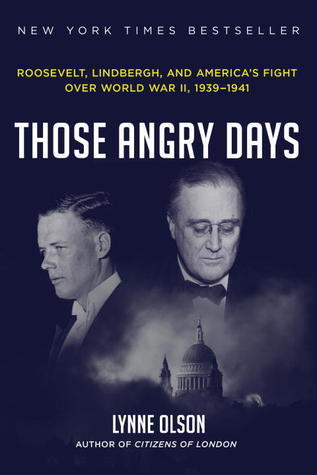
Those Angry Days
Roosevelt, Lindbergh, and America's Fight Over World War II, 1939-1941
کتاب های مرتبط
- اطلاعات
- نقد و بررسی
- دیدگاه کاربران
نقد و بررسی

January 21, 2013
It’s hard to recall, but going to war used to take a long time. The protracted two-year battle over F.D.R.’s gradual, hard-fought, bitter, and often necessarily devious campaign to prepare the U.S. for war and overcome powerful isolationist sentiment is the subject of this snappy, comprehensive book. At its center are Charles Lindbergh, a tin-eared, pro-German, unappealing, obtuse naïf, and F.D.R., wily but hemmed in by political forces. Olson, author of numerous books on the WWII era (including Citizens of London), manages to keep her complex, character-filled story on keel as she describes the forces bearing down on F.D.R.’s administration while the world slipped into war. Familiar and unfamiliar figures—military and civilian, private and public—people the book, and delicious tales abound. Overall, the story is sobering, and it’s hard to understand now how the run-up to America’s greatest war was so fraught with political and cultural explosives. Olson tells the story unerringly, but the book—however lively—is largely descriptive and short on ideas, argument, and point of view. Agent: Gail Ross, Ross Yoon Literary Agency.

Starred review from December 15, 2012
A fully fleshed-out portrait of the battle between the interventionists and isolationists in the 18 months leading up to Pearl Harbor. Former Baltimore Sun White House correspondent Olson (Citizens of London: The Americans Who Stood with Britain in Its Darkest, Finest Hour, 2010, etc.) looks closely at both sides of the U.S. debate about whether to support Britain against the onslaught of Nazi Germany or remain aloof from the European conflict, epitomized by the two prominent personalities of the respective camps, President Franklin Roosevelt and Charles Lindbergh. The author clarifies "those angry days," so-called by Arthur Schlesinger, and the deep, searing divisions within the country: from FDR, his hands tied to aid Britain materially by Senate Midwestern leaders like Burton Wheeler and Gerald Nye, who deeply resented the growing power of the presidency; to pro-German, frankly racist Lindbergh, whose trips to Germany and radio broadcasts helped sharpen the public outcry, gave fodder to prescient journalists like Dorothy Thompson and alienated his own long-suffering wife, Anne Morrow. Once viewed as America's great hero for his solo trans-Atlantic flight, Lindbergh spiraled into controversy with his public argument against aiding the English, his rationalization of German aggression and espousal of racial purity. Ostracized by the Europeans, who had not long before sheltered him and his wife after the kidnapping of his son, and excoriated by the press and the East Coast moneyed establishment, Lindbergh took up with the reactionary American First campaign and was increasingly regarded as traitorous. Roosevelt, in turn, warned the country about the "perils of complacency" in his State of the Union speech of 1940 as events in Europe heated up, and he was not averse to stoking fears of "Fifth column" infiltration and restricting civil liberties in garnering support for his policies. Throughout, Olson adroitly sifts through the many conflicting currents. A vivid, colorful evocation of a charged era.
COPYRIGHT(2012) Kirkus Reviews, ALL RIGHTS RESERVED.

March 15, 2013
Whether to intervene in World War II as Nazi Germany attacked England from the air is the focus of Olson's (Citizens of London: The Americans Who Stood with Britain in Its Darkest Hour) book about the robust struggle between America's isolationists and interventionists, with President Roosevelt (FDR), as portrayed here, caught in the middle. As assistant secretary of the navy during Woodrow Wilson's administration, FDR was well aware of Wilson's own fate with the League of Nations. Other accounts notwithstanding, e.g., Conrad Black's definitive Roosevelt, Olson portrays FDR as overly cautious and often lagging behind public opinion as it gradually came to support intervention against Germany. The bulk of the narrative here contrasts President Roosevelt and aviation hero Charles Lindbergh, the two most popular figures of the time. If the president was cautious, Lindbergh was indifferent to public opinion, caring more about aviation than politics. Olson focuses on Anne Morrow Lindbergh and her attempts to warn her husband about his ill-advised public statements against going to war. He disregarded her. VERDICT Though this subject is not new, Olson's focus on the Lindberghs and the pressure groups opposing and supporting the aviator offers additional insight into the period that ended with the Japanese attack on Pearl Harbor. Its readability further recommends the book to history buffs.--William D. Pederson, Louisiana State Univ., Shreveport
Copyright 2013 Library Journal, LLC Used with permission.

February 1, 2013
Olson's fourth history pivoting around the year 1940 chronicles America's debate about intervention in WWII. To recall its vituperative tone, something long since forgotten by the popular memory of wartime national unity, Olson incorporates the venomous vernacular in which advocates and opponents of intervention assailed each other into her time-line reportage of the controversy as it was affected by war news, the 1940 election, and such war preparations as the enactment of conscription and lend-lease. FDR's brawling secretary of the interior, Harold Ickes, took naturally to the idiom of vitriol, labeling isolationists as Nazis and traitors. As for the isolationist organization America First, Olson recounts its campaign to sway public opinion, which was more hindered than helped by the political obtuseness of its celebrity spokesman, Charles Lindbergh. Underscoring the period's passionate animosities, Olson parallels their playing-out in mass media and their sub rosa manifestations in illegal wiretaps and British espionage. Humanizing public events with private strains, on, for example, Anne Morrow Lindbergh, Olson delivers a fluid rendition of a tempestuous time.(Reprinted with permission of Booklist, copyright 2013, American Library Association.)

























دیدگاه کاربران